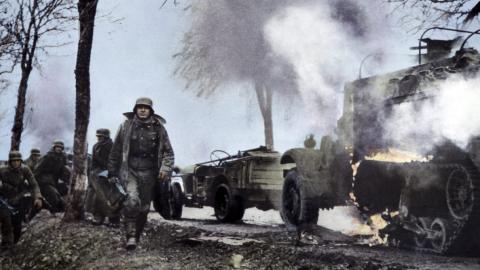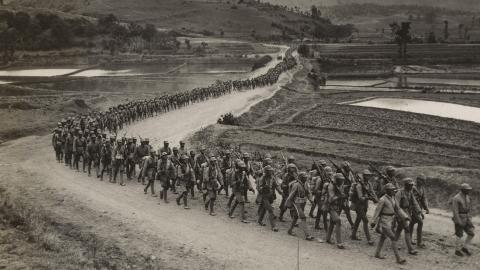The Incredible Story of Love and Survival at Auschwitz
Interview with Heather Morris author of The 'Tattooist of Auschwitz'
Heather Morris' historical novel 'The Tattooist of Auschwitz' is a love story set in the darkest of times. It tells the true story of how two Jewish prisoners, Lali, an Auschwitz tattooist, and Gita, who he tattooed, fell in love. Morris, an Australian writer, spent three years interviewing Lali Sokolov piecing together a story which she says, "had to be told."
To mark Holocaust Memorial Day (Saturday 27 January), HISTORY spoke to Morris - a writer based in Melbourne, Australia, who has written several screenplays, and this, her first novel - to find out more about this untold story.
Can you tell us about the Tattooist of Auschwitz?
Very simply it is a holocaust story, not the story of the holocaust. That's something I wish to be made really clear. I'm not trying to tell what went on at Auschwitz Birkenau in all its gore and horror. Rather, this is purely what one man [Lali Sokolov] saw and witnessed with his own eyes. Lali was in the privileged position of being the tattooist of Auschwitz and because of that, he was able to see things that other prisoners couldn't.
Was Lali a prisoner at Auschwitz?
Very much so, but also part of a community - for want of a better word. People there were assigned different jobs, they never volunteered mind, they were assigned them and you said no at your peril. Lali credits luck, he said he was just lucky, lucky, lucky every step of the way. To be picked out by the original tattooist and made his assistant, to then be upgraded, if you
What was Lali's background and how did he come to Auschwitz?
Lali was from a town in Slovakia, but later he was living in Bratislava working in a department store. As the Nazis started getting a stronghold in Slovakia all Jews were banned from working, so he returned to his family home. Whilst he was there the Slovakian government put out a notice saying that one young adult or older child was to go work for the Germans. Lali volunteered on behalf of his family. He had a brother who was married with two small children plus a younger sister so he said: "I'm going."
Did he know where he was going?
No, he thought he was just going off to work for the Germans. That's how so many went, lots of young girls and boys who sacrificed themselves. They went, they waited all gathered from all over Slovakia, then they were shipped out together, all just thinking they were going to a work camp.
What year was that?
Lali got to Auschwitz in April 1942. He was there until the end of the war. I've got a document with his name on it. It's the list of all the prisoners who came to Auschwitz on that day on that train, it's a list of names, numbers, dates of births, and where they were from.
And incredibly, it was here that Lali fell in love?
It's a wonderful story, an unheard of story.
I'd always chortle when I'd meet some of Lali's friends, particularly the women who had also been in concentration camps. They'd look at me and say "Ahh Lali's friend, did you know that Lali and Gita met at Auschwitz? And that they fell in love there? Who falls in love at a concentration camp? Only Lali and Gita!" It really tickled even their oldest friends.
But yes, during his job, Gita was in one of the first groups of females transferred to Birkenau. When she was transferred there the number on her arm had faded, originally they were stamped on not tattooed, so she was lined up to get her number re-inked.
Lali never looked at the girls, he'd only just started doing females and he hated it. But in this one instance, Gita put her arm out to him and one of the doctors - who was constantly walking up and down the row selecting girls to be taken away to be their patients, shall we say - came up and started examining her very roughly, hurting her, prodding her. Lali felt her wince, and looked up as she was starting to say something, he said "shhh." For the first time, he looked into her eyes and she looked back at him, he said that was it.
This was a young man who had spent his life - he willingly admitted - as a playboy. He was a lad, a man about town, and here he was falling in love with a girl who he had shaved and dressed in rags. From that moment he could look at no other.
Incredible, could they start a relationship?
Yes, at every opportunity they got they would be together. There were thousands of people at the compound, so on rest days, it was quite easy to hide amongst the other prisoners. Gita's friends would form a circle and collude to get Lali and her together. Also because of his role, it was accepted that he could go into the women's camp because he had to tattoo them. The SS knew who he was and so they got away with it.
Amazing to think that love could come in this environment, but it was everyday life for people there, everyday things happened.
Gita never thought they could have a life outside. She didn't see them leaving, she has seen just too much death. She had recorded it, she had a job in the administration building which housed all the cards with the prisoner's names, she saw them all. She wouldn't give Lali basic details like her surname or where she came from. Lali was the complete opposite, he used to tell her all the time, "We will leave here, we will have a life outside of here," for him there was nothing surer. They had these conflicting ways that they looked at their time there.
And they did get out...
Yes, but, Gita was taken on a death march. Lali watched her walk out, alongside all the women in the camp. All he could do was get the message to her to run, the first chance you can, run. Of course, he didn't know if she did. When he eventually escaped from another camp - he was taken out of Auschwitz on the last day that the Germans held it - he felt that she was still alive.
And how did she survive?
When they were into the second day of the death march, it was the middle of winter, they were just being shot and killed as they marched on the road or into the forest. She was with three Polish girls as they approached a farmhouse who said, "We're running, coming with us?" and she said "Yes." So these four young girls ran and because there were so many thousands of prisoners, plus at that point the SS numbers were dwindling, they survived. They spent many weeks hiding out in the forest, or in small villages and roofs of houses. Her escape is an amazing story in itself, which is outlined in the book.
How did this story come to you?
From a friend of a friend, when Gita died in 2003. That was the impetus for Lali to tell his story, he wouldn't before that. They had a mutual friend of theirs, a young girl who had been made the concubine of the commandant at Birkenau. She survived Auschwitz, but a couple of years later when she was back in Slovakia she was charged by the Russians for being a Nazi collaborator - she chose to survive by not saying no to the commandant - and she was sent to Siberia for fifteen years.
Lali knew, deep down, that nothing that Gita or he did was collaborating, but they had survivors guilt and fear. They didn't think their friend was a collaborator either. They said nothing for fifty years until Gita died.
I've written a couple of screenplays all of which have been based on real events, and Lali asked his son to find someone to tell my story too, but he didn't want them to be Jewish. A friend of a friend mentioned it to me, so we met, the start of a three-year friendship. It started with me meeting a man two months after the death of his wife who told me to hurry up and write. He just wanted to be with Gita he didn't want to live any longer. His son credits me with giving him three years extra with his dad. He found a reason to live, and that reason was to tell his story.
How did he tell that story?
It took a while for him to open up and tell me these deep secrets and horrors of what he'd witnessed. Plus history and memory, where do they meet and where do they part? We then had to get professional researchers to check it. We wanted as much of his story as we could, so we needed much to be verified through research and we were lucky to uncover many documents.
What did Lali say about Auschwitz?
He lost his faith. How could he not when daily he stood beside Josef Mengele and watched him select youngsters, mostly children, and do the things he did to them. To see the inhumanity on that scale, he was utterly scarred.
By the way, his parents died there too. We found documents showing that they had been brought to the camp, killed the day they arrived. He never knew that, I uncovered it after he died.
But, on the other hand, he was such an optimist. He knew that the only way he could honour all those people who died was to go and lead the best life he could. He used to say to me, "every day of your life, if you wake up in the morning it's a good day, live the life the best you can," and he did.
What has it been like carrying the responsibility of this story?
It was a huge responsibility, a challenge, but I knew the story had to be told. But, we had become such close friends that at times I questioned whether I was the right person to tell it. Also, I don't have a background in journalism and I thought, who am I to do justice to this story. But, he just had faith in me, "you can do it," he would tell me.
He read some of the early stuff and loved it, he wouldn't hear of anyone else telling it. So I just took it on and said, "this is something I will not give up doing or trying to tell." The night he died, his son gave me some time to spend alone with him and literally the last thing I said to him was, "You go and be with Gita and I will never give up trying to tell your story."
















